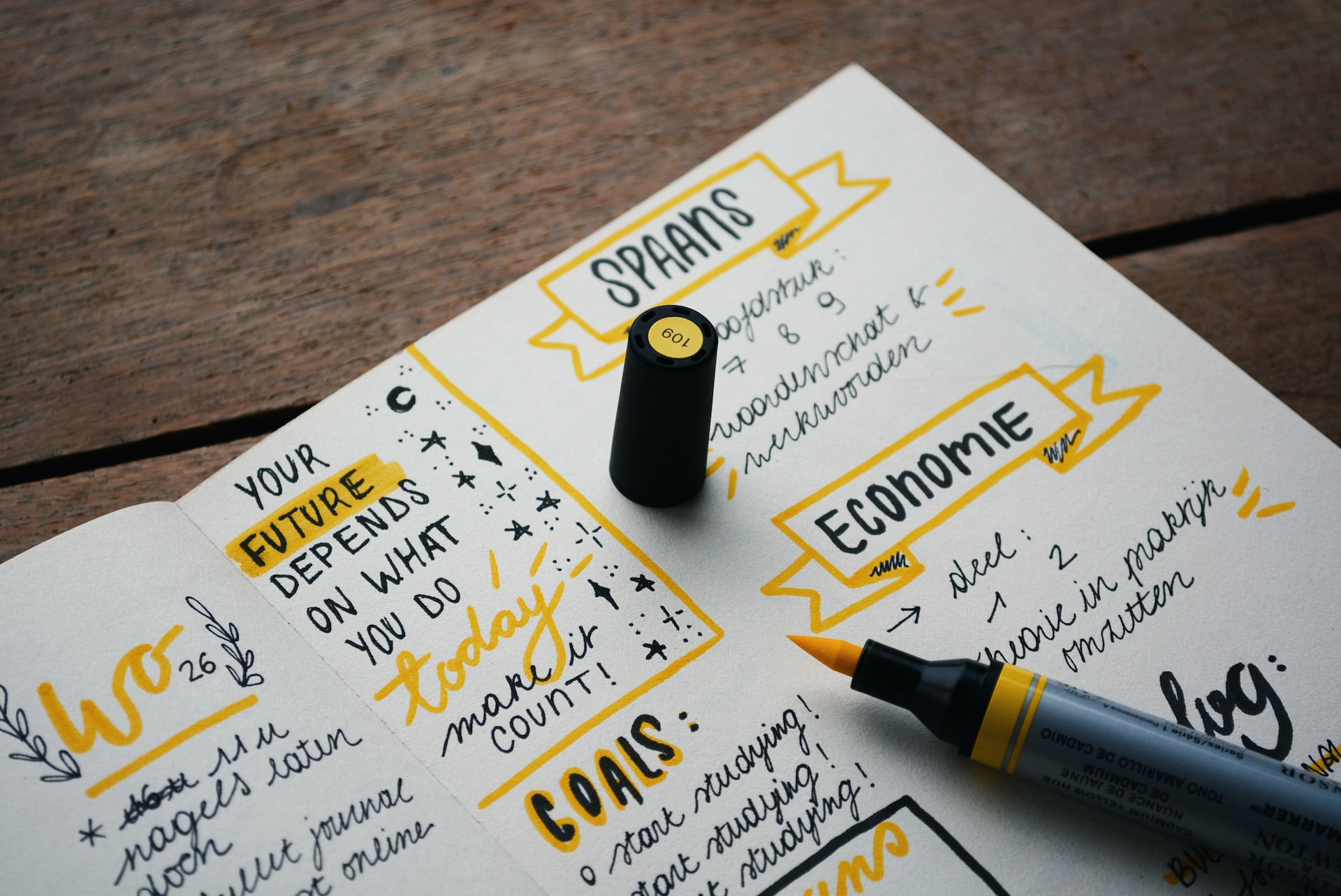A vision board is a powerful tool that can help you clarify your intentions, visualize your desired outcomes. It helps you to stay motivated and accountable as you work towards your dreams. In the following tips, we will share with you some practical and effective strategies for creating a powerful vision board that actually works.
- Tip #1: Clarify Your Intentions and Priorities
- Tip #2: Use a variety of materials
- Tip #3: Use Visuals That Inspire and Motivate You
- Tip #4: Include Specific and Measurable Goals
- Tip #5: Add Affirmations and Positive Statements
- Tip #6: Make Your Vision Board Interactive and Dynamic
- Tip #7: Make Your Vision Board Visible and Accessible
- Tip #8: Review and Update Your Vision Board Regularly
- Tip #9: Use Your Vision Board as a Tool for Action and Accountability
- Tip #10: Celebrate Your Successes and Learn from Your Challenges
- Conclusion
Tip #1: Clarify Your Intentions and Priorities

The first and most important step in creating a powerful vision board is to clarify your intentions and priorities. This means taking the time to ask yourself what you truly want to achieve, why it matters to you, and what steps you need to take to get there.
To do this, start by setting aside some quiet time for reflection and introspection to find your why.
Questions to ask for finding your why:
- What are my most important goals and aspirations?
- Why do these goals matter to me?
- How will achieving these goals improve my life and the lives of others?
- What obstacles or challenges do I need to overcome to achieve these goals?
- What skills, resources, or support do I need to acquire or develop to achieve these goals?
As you answer these questions, be honest and specific about your desires and motivations. Don’t be afraid to dream big and aim high, but also be realistic and practical about what it will take to achieve your goals. When you understand your « why, » you can better align your goals with your values and passions. So you are making them more meaningful and fulfilling.
Once you have a clear sense of your intentions and priorities, write them down in a (digital) journal or notebook. This will help you clarify your thoughts and feelings, and also serve as a reference point for your vision board.
When writing down your goals and aspirations, make sure to use clear and specific language. Instead of vague or general statements, such as « be happy » or « make more money, » use concrete and measurable goals. Use « travel to Europe by the end of the year » or « increase my income by 25% in the next 6 months. »
In summary, clarifying your intentions and priorities is the foundation of creating a powerful vision board that actually works. By being clear, specific, and committed to your goals and aspirations. You can create a vision that inspires and motivates you to take action and achieve your dreams.
Tip #2: Use a variety of materials
The format and materials you choose for your vision board that actually works are crucial to its effectiveness. You want to choose materials that resonate with your goals and personal style, and that are visually appealing and high-quality. Additionally, you want to consider whether you want to create a physical or digital board, based on your personal preferences and resources.

Choose materials that inspire and motivate you, and that represent your desired outcomes and emotions. For example, if you want to travel the world, you might choose images of exotic destinations or travel quotes that resonate with you.
Make sure to select high-quality materials that will withstand the test of time. Choose materials that will look visually appealing when arranged on your board. You can use a bulletin board, poster board, or canvas as your base, depending on your preference. When arranging your materials, use a layout that is visually appealing and makes sense to you.
If you prefer a digital vision board, then you can use online tools such as the Vison Board ++ app. Digital vision boards have the added advantage of being easily accessible and shareable, and can be updated or revised quickly and easily.
To recap, choosing the right format and materials for your vision board is essential to its effectiveness. Whether you prefer a physical or digital format, make sure to select materials that inspire and motivate you, and that represent your desired outcomes and emotions. This will help you create a vision board that resonates with you and keeps you inspired and focused on your goals.
Tip #3: Use Visuals That Inspire and Motivate You

The visuals you choose for your vision board are essential to its effectiveness. The right visuals can inspire and motivate you, and help you stay focused and aligned with your goals and aspirations. When selecting visuals, it’s important to choose images, words, or symbols that resonate with your goals and values. Check that they evoke positive emotions such as joy, excitement, or gratitude.
To choose the right visuals, start by reviewing your list of goals and aspirations. Think about what images or symbols represent each goal, and what emotions or values they evoke. For example, if your goal is to start a business, you might choose images of successful entrepreneurs or business logos that inspire you. If your goal is to improve your health, you might choose images of healthy foods or fitness activities that motivate you.
When selecting visuals, make sure to choose those that are high-quality, visually appealing, and meaningful to you. You can use images from magazines, online sources, or your own personal collection. You can also add text or symbols that reinforce your goals and aspirations. Use affirmations, quotes, or symbols that represent success, abundance, or happiness.
Tip #4: Include Specific and Measurable Goals
One of the keys to creating a powerful vision board that actually works is to include specific and measurable goals. This means focusing on concrete and achievable goals that you can track and measure over time, rather than vague or general aspirations that lack clarity and specificity.
When setting goals for your vision board, make sure to use clear and specific language. Instead of saying « I want to be happy, » consider what actions and outcomes would make you happy, and set a goal that reflects this. For example, you could set a goal to spend each Sunday with loved ones, or to take a specific course this year that you have researched.

It’s also important to make your goals measurable, so you can track your progress and celebrate your achievements along the way. For example, if your goal is to run a 10K by the end of the year, you can break this down into smaller, measurable steps, such as running a 5K race, or increasing your mileage every month.
When setting goals, it’s important to choose ones that are challenging yet achievable, and that are aligned with your values and passions. Don’t be afraid to set big goals, but also be realistic about what it will take to achieve them.
By including specific and measurable goals on your vision board, you are giving yourself a roadmap for success and a clear target to aim for. This will help you stay focused and motivated, and will also help you track your progress and make adjustments as needed.
To summarize, it is crucial to include specific and measurable goals on your vision board as they are vital in achieving your desired outcomes. By setting clear and achievable goals that align with your values and passions, you can create a roadmap for success and stay motivated and focused as you work towards your dreams.
Tip #5: Add Affirmations and Positive Statements
Affirmations and positive statements are a powerful addition and are a key element to have a vision board that really works. Affirmations can help you shift your mindset and beliefs towards your desired outcomes. The words and phrases you use on your vision board have a profound impact on your subconscious mind, and can influence your thoughts, emotions, and actions.
When selecting affirmations and positive statements for your vision board, choose those that resonate with your goals and values, and that inspire and uplift you. Use language that is positive, present-tense, and empowering. For example, instead of saying « I will be successful, » say « I am successful. » This helps to create a sense of confidence and belief in your ability to achieve your goals.
Examples of affirmations and positive statements:
- « I am capable of achieving my dreams »
- « I trust in my own path and journey »
- « I am worthy of abundance and prosperity »
- « I am grateful for all the blessings in my life »
- « I am confident in my ability to overcome challenges »
- « I am surrounded by positive and supportive people »
You should create your own affirmations and positive statements that reflect your unique goals and aspirations. When creating your own statements, make sure to use language that resonates with you, and that reflects your personal values and passions.
When adding affirmations and positive statements to your vision board, make sure to choose a font and color scheme that are visually appealing and easy to read. You can also highlight or emphasize certain words or phrases to make them stand out.
In summary, adding affirmations and positive statements to your vision board can help you shift your mindset and beliefs towards your desired outcomes. By choosing words and phrases that resonate with your goals and values, and that inspire and uplift you, you can create a vision board that not only looks visually appealing but also motivates and empowers you to achieve your dreams.
Tip #6: Make Your Vision Board Interactive and Dynamic
To keep your vision board fresh and engaging, consider making it interactive and dynamic. An interactive vision board that actually works is one that is not just a static image, but one that changes and evolves over time. By making your vision board interactive and dynamic, you can stay motivated and inspired as your goals and aspirations evolve.
One way to make your vision board interactive is to add movable elements, such as post-it notes, magnets, or stickers, that you can update or move around as your goals evolve. For example, if you have a goal to travel to different countries, you can add post-it notes with the names of the countries you want to visit, and move them around as you plan your itinerary.
Another way to make your vision board interactive is to include a progress tracker. This can be a chart or graph that shows your progress towards your goals over time. By tracking your progress, you can see how far you’ve come and how much further you have to go, which can be a powerful motivator.
When making your vision board interactive, make sure to choose materials that are easy to update or change. You can use colorful markers, stickers, or other decorations to make your board fun and engaging. Or you can use a digital vision board where you can easily set and update your progress, or adapt it.

Tip #7: Make Your Vision Board Visible and Accessible
Creating a vision board is just the first step in achieving your goals and aspirations. To get the most out of it, you need to make sure that you display it in a visible and accessible place. This means choosing a location where you’ll see it frequently and can easily review and update it as needed.
When choosing a location for your vision board, consider your daily routine and where you spend most of your time. You might choose to display it in your bedroom, office, or living room, depending on your preference and lifestyle. You could also consider displaying it in multiple locations to ensure that you see it frequently throughout the day.
Make sure to display your vision board in a place where it will be easily accessible. This means making sure that it is within reach and that you can easily move and update it as needed. If you choose to display a physical board, you could use a stand or easel to keep it upright, or use adhesive strips to attach it to a wall.
Consider adding your vision board as your smartphone background by taking a photo or exporting it from an app, and utilizing widgets on your iOS or Android smart phone to see it frequently.
Tip #8: Review and Update Your Vision Board Regularly
Your vision board is a living document that evolves with you as you progress towards your goals and aspirations. To ensure that it remains relevant and effective, it’s important to review and update it regularly. Set aside time each week or month to reflect on your progress, revise your goals, and update your visuals or affirmations as needed.
During your review process, take a moment to reflect on your progress towards your goals. Review your progress regularly and assess what is working well and what needs improvement. Celebrate your successes and acknowledge any challenges or obstacles you’ve faced. Use this time to evaluate whether your goals are still aligned with your current aspirations and whether the visuals and affirmations on your board still resonate with you.
What to ask yourself in the review?
- What progress have I made towards my goals since my last review?
- Are my long-term goals still aligned with my values, passions, and overall vision for my life?
- Do I have a realistic timeline for achieving my goals?
- Do I need to adjust my vision board to better align with changes in my life circumstances or priorities?
- What are my next steps towards achieving my goals, and how can I break them down into actionable steps?
If you find that your goals or aspirations have changed, don’t be afraid to revise them. Your vision board should reflect your current desires and dreams, not the ones you had in the past. Replace outdated visuals and affirmations with ones that align with your current goals and values.
In addition to updating your goals and visuals, it’s important to update your action plan as well. Make sure that you’re taking concrete steps towards your goals and adjust your plan as needed. Use your vision board to remind yourself of the actions you need to take and stay focused on your progress.

In summary, reviewing and updating your vision board regularly is essential to keeping it relevant and effective. Set aside time each week or month to reflect on your progress, revise your goals, and update your visuals or affirmations as needed. By staying aligned with your evolving aspirations and adjusting your plan as needed, you can ensure that you have a vision board that really works. It remains a powerful tool for motivation and inspiration.
Tip #9: Use Your Vision Board as a Tool for Action and Accountability
Your vision board is a powerful tool for motivation and inspiration, but it can also be used as a tool for action and accountability. By using your vision board to set goals, track progress, and hold yourself accountable, you can turn your dreams into reality.
Set specific goals
One way to use your vision board as a tool for action is to set specific, measurable, and achievable goals based on the images and statements on your board. For example, if you have a picture of a fit and healthy person on your board, set a goal to exercise for 30 minutes a day or to eat a healthy meal at least once per day. Use your board to track your progress towards these goals, and to celebrate your successes along the way.
Accountability partner
Another way to use your vision board as a tool for accountability is to share it with someone else, such as a friend or coach. By sharing your vision board with someone else, you can gain support, encouragement, and feedback on your goals and progress. You can also set up regular check-ins to review your progress and make any necessary adjustments to your goals.
Source of motivation
Lastly, use your vision board to stay focused and motivated when faced with obstacles or setbacks. Whenever you feel discouraged or overwhelmed, turn to your board for inspiration and reminders of why you started on this journey in the first place.
In summary, your vision board is not just a pretty collage of images and words – it’s a powerful tool for action and accountability. Use it to set specific and achievable goals, track your progress, hold yourself accountable, and stay focused and motivated. By using it in this way, you create a vision board that actually works and turn your dreams into reality.
Tip #10: Celebrate Your Successes and Learn from Your Challenges

Achieving your goals can be a long and challenging journey, but it’s important to celebrate your successes along the way. Each time you achieve a goal, no matter how small, take a moment to acknowledge and celebrate your accomplishment. This will help you stay motivated and encouraged as you continue on your journey.
In addition to celebrating your successes, it’s also important to learn from your challenges and setbacks. Each challenge is an opportunity to learn and grow, and to become stronger and more resilient. Take time to reflect on what you learned from your challenges and how you can apply those lessons to future situations.
Remember, the journey towards achieving your goals is not always easy, but the lessons learned along the way are just as important as the end result. By celebrating your successes and learning from your challenges, you can continue to grow and develop as a person and achieve even greater success in the future.
In summary, it’s important to celebrate your successes and learn from your challenges as you work towards achieving your goals. Use your vision board as a tool for reflection and growth, and regularly assess what is working well and what needs improvement. By celebrating your successes and learning from your challenges, you can stay motivated, encouraged, and on track towards achieving your dreams.
Conclusion
You’ve learned that a vision board is a powerful tool for turning your dreams into reality. By following our 10 tips, you can create a vision board that actually works. The key is to set specific and measurable goals, add affirmations and positive statements, and make it interactive and dynamic by reviewing it regularly.
But let’s not forget learning from our challenges along the way. By regularly assessing what is working well and what needs improvement, we can stay motivated, encouraged, and on track towards achieving our dreams.
So, I encourage you to use your vision board not only as a tool for action and accountability, but also as a tool for reflection and growth. Celebrate your successes, no matter how small. By doing so, you’ll achieve the success you desire.
Remember, you have what it takes to make your dreams a reality. Keep moving forward and stay focused on your goals, and with the help of your vision board, you can achieve anything you set your mind to.

